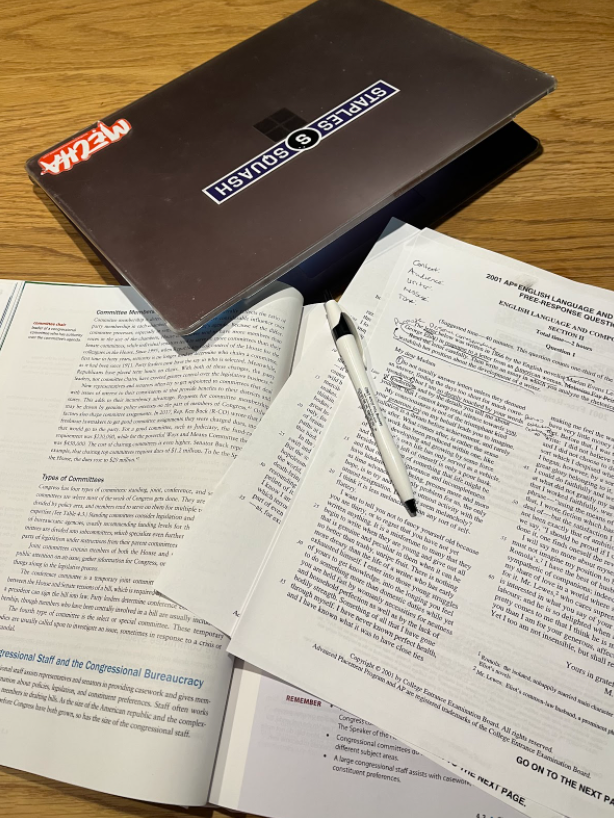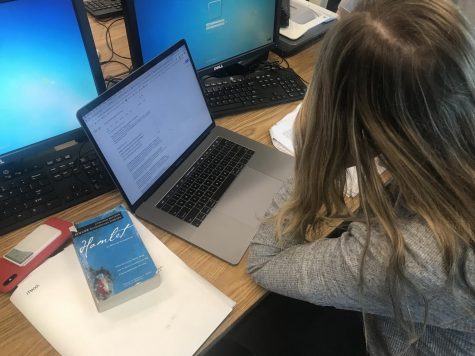Variations in workload vex Staples students
Staples students enrolled in the same level classes have a wide variation in the amount of homework they receive depending on their teacher. This is harmful to student health and school culture.
Nightmares about pop quizzes on class readings from the night before plague some Staples students, forcing them on a rollercoaster of constant stress and relief with every day of school. Others simply crack their knuckles, sit down and watch an easy video while jotting down a few notes. These two students may be taking the exact same class, yet, because of their varying teachers, the lost hours of sleep and piles of essays, tests and worksheets stack up very differently.
When I got my class assignments for the 2021-2022 school year this summer, my friends flocked to me with comments such as, “Wow, your teachers are so good. You’re so lucky,” and “Your classes will be so nice this year.” This isn’t a comment on the quality of my teachers, just as it is not a criticism of the teaching ability of the alternative instructors I may have received. These judgments were based on the reputation of the workload each teacher assigns.
Look, I get it. Teachers should be able to personalize the way they teach their class; teaching is an art, and there are many ways to paint a beautiful canvas. I am not advocating for a standardization of homework assignments. The department curriculums adequately cover what we students need to know, and teachers’ unique skills and personalities bring it to life.
However, teachers should be aware of the stress their students are under while taking their class, and teachers of the same course should agree on relatively the same amount of work required of their students. Students deserve equal treatment. That’s a fact that everyone can agree on.
According to the CDC, teenagers aged 13-18 need eight-10 hours of sleep a night. With the conglomeration of extracurricular and homework students already have. Adding extra homework means many students score much less than their needed amount of sleep. Stanford Medicine explains that less sleep means poorer performance in school, worse mental health and even increased propensity towards physical illness. Even though the extra homework is assigned to students to help them further understand class content, in reality, it is hurting them.
However, unequal work levels aren’t only detrimental to students’ wellness. It also allows the underbelly of Staples’ competitive culture to rear its ugly head. “You got an A in that class? Well, it doesn’t really count because it’s so easy with that teacher.” High grades demand hard work. They shouldn’t be diminished in value just because someone has one teacher versus another.
Stanford Medicine explains that less sleep means poorer performance in school, worse mental health and even increased propensity towards physical illness.
— Lilly Weisz '23
Yes, this is on the onus of the students, however, the root cause isn’t really the competition. Students are discontented and jealous that what’s being demanded of them consumes so much of their time and energy when, at the end of the day, they develop a similar skillset to those with less work.
For example, Staples AP teachers are good, and Staples students consistently score high on AP tests with a mean score of 3.9 out of 5 in 2021. Yet the variation in homework amount in the same AP class can be anywhere from the ability to finish homework in class to hours upon hours at home. If students can learn the same thing and get the same test scores with less work, why not reduce the load?
I even have friends who have been completely turned off from certain subjects because of the workload expected of them by one teacher, while others received a different teacher and fell in love with the subject. The variations in classwork from different teachers actively discourage students from wanting to learn. And isn’t instilling a passion for learning what school is meant to do?
With that being said, this is not an attack on Staples teachers. I appreciate how hard they work to give kids in Westport a good, no, a great education. But if teacher’s coordinated how much work they gave students with teachers of the same class level, Staples as a whole would be greatly improved.

Creative Director Lilly Weisz ’23 has no hesitation when it comes to helping out with anything Inklings related. When Weisz originally joined Inklings,...






























































